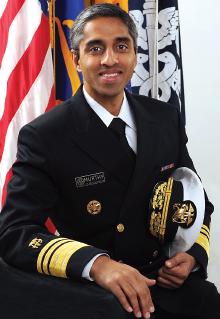Surgeon General Calls on Physicians to Help End Opioid Abuse
Abstract
A loose approach to prescribing drugs to treat chronic pain needs to be corrected, says U.S. Surgeon General Vivek Murthy, M.D., M.B.A.
Overdose deaths—primarily due to prescription pain relievers and heroin—have quadrupled in the United States since 2000, reaching 28,467 deaths in 2014, according to the Centers for Disease Control and Prevention (CDC).

Once touted as the answer to chronic pain, opioids have become a major drug of abuse, and physicians must become more circumspect in prescribing them, says U.S. Surgeon General Vivek Murthy, M.D., M.B.A.
The causes of this upsurge are complex, but today’s epidemic can be said to have begun in the 1990s, when physicians were encouraged to pay greater attention to pain and to treat it more aggressively, according to U.S. Surgeon General Vivek Murthy, M.D., M.B.A.
At the same time, pharmaceutical companies increased marketing efforts directed at physicians for opioids.
“The results have been devastating,” wrote Murthy in a letter that was sent to all U.S. physicians in late August. The letter—which Murthy noted marks the first sent from his office to health professionals to address a public health crisis—is part of the Surgeon General’s TurnTheTide Campaign, a national effort to raise awareness about those affected by opioid use disorder, successful treatment programs, and the challenges that remain in communities hardest hit by the epidemic.
He urged physicians to take the pledge posted on his website to help stem the nation’s opioid epidemic by learning how to treat pain safely, screening patients for opioid use disorder, and educating the public about addiction.
“Years from now, I want us to look back and know that in the face of a crisis that threatened our nation, it was our profession that stepped up and led the way,” wrote Murthy. He suggested that clinicians follow guidelines from the CDC in assessing pain and function.
“If physicians within the house of medicine work together, we can implement better, safer treatments for pain and get patients who currently have an opioid use disorder into treatment programs that can help,” said APA CEO and Medical Director Saul Levin, M.D., M.P.A.
“Opioids can provide short-term benefits for moderate to severe pain,” the CDC reminds prescribers. “Scientific evidence is lacking for the benefits to treat chronic pain.”
With that in mind, clinicians should discuss with patients the benefits and risks of treatment alternatives. Murthy asked doctors to consider nonopioid therapies for chronic pain, like NSAIDS or physical therapy, before prescribing opioids, when possible.
If opioids are indicated, the CDC advises starting with a low-dose, immediate-release formulation. Reassessment should come one to four weeks after the initial prescription.
Screening can identify patients who meet criteria for opioid use disorder, enabling the provision or a referral for treatment, particularly that assisted by medications like methadone, buprenorphine, or naltrexone.
Finally, Murthy urged his fellow physicians to make clear to other Americans that addiction is a chronic illness and must be approached that way.
“There is no single solution to the opioid abuse epidemic,” wrote Jerome Adams, M.D., M.P.H., of the State of Indiana Department of Health in Indianapolis, and two colleagues in the June American Journal of Public Health. “We must educate the public and prescribers about the dangers of opioids, teach prescribers about opioid alternatives for pain management, optimize prescription drug monitoring programs, and increase the availability of substance-use disorder management.” ■
To read more and pledge your support of the Surgeon General’s campaign to end the opioid epidemic and access APA training and other resources on opioid use disorder, click here.



